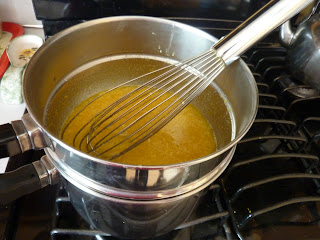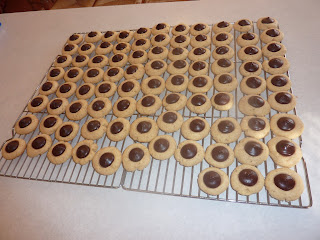Lemon Curd
You don't have to be English and hold a high tea to partake of the bliss that is Lemon Curd.
You also don't need a bunch of fancy ingredients or advanced cooking skills.
Do you know Lemon Curd? Oh, you should! It is the thick, sweet, tangy, golden, creamy and heavenly spread that is best known as on of the elements of afternoon tea. Lemon Curd, jam, Devonshire Cream, scones, tea, cucumber sandwiches, and other dainty and delicious things.
Lemon curd goes way beyond tea, though. It makes a terrific filling for a cake, it's great on toast or bread (how we most often eat it), or as an addition to strawberry shortcake. This summer, find some fresh-picked strawberries, split a biscuit, spread on some lemon curd, top with sliced strawberries, the other half of the biscuit, and a dollop of whipped cream. In fact, skip dinner that night and just have the strawberry shortcake. Plenty of food groups represented there.
Alright, let's take the mystery out of Lemon Curd. Once you are convinced of your love, you'll be thrilled to know how quick and easy it is to make at home. Cost may also work it's way into your heart - at my grocery store, an 8 ounce jar of lemon curd costs anywhere from $6-8. Usually on the higher end. That's a buck an ounce - ouch!
You need five food ingredients (actually four), a double boiler and your stove top, a citrus zester or grater, a whisk and a strainer.
Lemon Curd
5 large egg yolks
1 cup sugar
3-4 lemons (the zest from them, plus a 1/3 cup of juice)
1 stick of butter (1/2 cup)
In the top of a double boiler, OR in a bowl that you can set over a pan of simmering water, combine the egg yolks, sugar, zest and juice.
Today, 3 lemons provided the amount of juice needed. Size and weight matter, so make sure you have 4 or even 5 lemons around, in case they are small or not as juicy. Conventional lemons have wax on them, so either scrub them well or buy organic and just rinse. You don't want wax in your lemon curd :) I use a "zester" to remove the outer yellow skin from the lemon (no white, please), then chop the strands with a knife. You can grate them on the small holes of a grater, same effect. After you remove the zest, cut the lemons in half and squeeze or ream them to remove all the juice (I do it over a small strainer set in my measuring cup, no seeds that way).
Place the double boiler over simmering water, kept on low, OR place the bowl over a pan of simmering water, not letting it touch the water. You don't want the egg yolks to scramble, only to cook very slowly and thicken.
Using a wire whisk, stir the mixture continually, and the process takes about 10-15 minutes. At first it will get thinner and you'll believe you've messed up and it will never get thick. Do not despair! Keep whisking slowly and in a while it will start to thicken. Once it gets to the consistency of thick cream, remove it from the heat. Add the butter in 5 or 6 pieces, whisking each time to combine. Now it will be nice and thick!
Depending upon your eggs, lemon curd may be a pale yellow (factory eggs with light colored yolks) or a much darker shade (organic eggs, farm raised chickens). Mine is a lot darker than the curd I see in the grocery store.
Using a fine mesh strainer, push the curd through to strain out all the lemon zest. Store in a glass jar in the refrigerator. It will keep for a couple of weeks, but it won't be around that long!
This recipe makes about 1 and 3/4 cups. I was reminded that doubling the recipe is the smart thing to do, with the size family I have. They all love it, and it disappears rapidly
In the double boiler.
Don't worry, the end product will be smooth and creamy!
Lovely, yellow joy.
Had to do a taste-test.
When the kids came upstairs for lunch, they could all smell lemons. That's a good thing.
You also don't need a bunch of fancy ingredients or advanced cooking skills.
Do you know Lemon Curd? Oh, you should! It is the thick, sweet, tangy, golden, creamy and heavenly spread that is best known as on of the elements of afternoon tea. Lemon Curd, jam, Devonshire Cream, scones, tea, cucumber sandwiches, and other dainty and delicious things.
Lemon curd goes way beyond tea, though. It makes a terrific filling for a cake, it's great on toast or bread (how we most often eat it), or as an addition to strawberry shortcake. This summer, find some fresh-picked strawberries, split a biscuit, spread on some lemon curd, top with sliced strawberries, the other half of the biscuit, and a dollop of whipped cream. In fact, skip dinner that night and just have the strawberry shortcake. Plenty of food groups represented there.
Alright, let's take the mystery out of Lemon Curd. Once you are convinced of your love, you'll be thrilled to know how quick and easy it is to make at home. Cost may also work it's way into your heart - at my grocery store, an 8 ounce jar of lemon curd costs anywhere from $6-8. Usually on the higher end. That's a buck an ounce - ouch!
You need five food ingredients (actually four), a double boiler and your stove top, a citrus zester or grater, a whisk and a strainer.
Lemon Curd
5 large egg yolks
1 cup sugar
3-4 lemons (the zest from them, plus a 1/3 cup of juice)
1 stick of butter (1/2 cup)
In the top of a double boiler, OR in a bowl that you can set over a pan of simmering water, combine the egg yolks, sugar, zest and juice.
Today, 3 lemons provided the amount of juice needed. Size and weight matter, so make sure you have 4 or even 5 lemons around, in case they are small or not as juicy. Conventional lemons have wax on them, so either scrub them well or buy organic and just rinse. You don't want wax in your lemon curd :) I use a "zester" to remove the outer yellow skin from the lemon (no white, please), then chop the strands with a knife. You can grate them on the small holes of a grater, same effect. After you remove the zest, cut the lemons in half and squeeze or ream them to remove all the juice (I do it over a small strainer set in my measuring cup, no seeds that way).
Place the double boiler over simmering water, kept on low, OR place the bowl over a pan of simmering water, not letting it touch the water. You don't want the egg yolks to scramble, only to cook very slowly and thicken.
Using a wire whisk, stir the mixture continually, and the process takes about 10-15 minutes. At first it will get thinner and you'll believe you've messed up and it will never get thick. Do not despair! Keep whisking slowly and in a while it will start to thicken. Once it gets to the consistency of thick cream, remove it from the heat. Add the butter in 5 or 6 pieces, whisking each time to combine. Now it will be nice and thick!
Depending upon your eggs, lemon curd may be a pale yellow (factory eggs with light colored yolks) or a much darker shade (organic eggs, farm raised chickens). Mine is a lot darker than the curd I see in the grocery store.
Using a fine mesh strainer, push the curd through to strain out all the lemon zest. Store in a glass jar in the refrigerator. It will keep for a couple of weeks, but it won't be around that long!
This recipe makes about 1 and 3/4 cups. I was reminded that doubling the recipe is the smart thing to do, with the size family I have. They all love it, and it disappears rapidly
In the double boiler.
Don't worry, the end product will be smooth and creamy!
Lovely, yellow joy.
Had to do a taste-test.
When the kids came upstairs for lunch, they could all smell lemons. That's a good thing.







Now you need a recipe using the egg whites! I've wanted to try this for quite a while, but just haven't done it yet. I love having your blog bookmarked as my online cookbook :)
ReplyDeleteOk, I can all of my lemon curd....do you do this? After I get it made I just put into sterilized jars and water bath for 20 minutes. Store on the shelf! :) I LOVE lemon curd....its just so.....summery! ;) --S
ReplyDelete